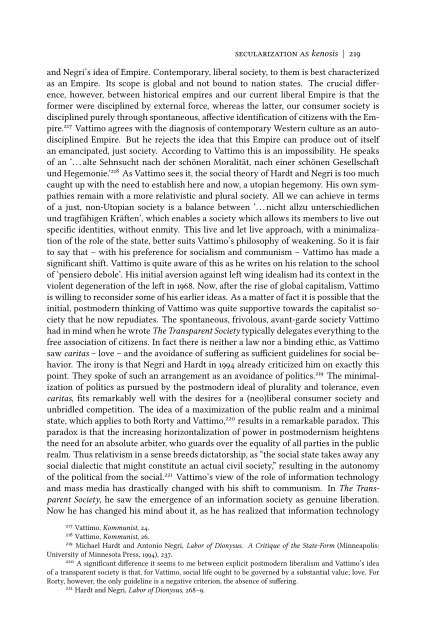Secularization as Kenosis
Secularization as Kenosis
Secularization as Kenosis
Create successful ePaper yourself
Turn your PDF publications into a flip-book with our unique Google optimized e-Paper software.
secularization <strong>as</strong> kenosis | 219<br />
and Negri’s idea of Empire. Contemporary, liberal society, to them is best characterized<br />
<strong>as</strong> an Empire. Its scope is global and not bound to nation states. The crucial difference,<br />
however, between historical empires and our current liberal Empire is that the<br />
former were disciplined by external force, where<strong>as</strong> the latter, our consumer society is<br />
disciplined purely through spontaneous, affective identification of citizens with the Empire.<br />
217 Vattimo agrees with the diagnosis of contemporary Western culture <strong>as</strong> an autodisciplined<br />
Empire. But he rejects the idea that this Empire can produce out of itself<br />
an emancipated, just society. According to Vattimo this is an impossibility. He speaks<br />
of an ‘. . . alte Sehnsucht nach der schönen Moralität, nach einer schönen Gesellschaft<br />
und Hegemonie.’ 218 As Vattimo sees it, the social theory of Hardt and Negri is too much<br />
caught up with the need to establish here and now, a utopian hegemony. His own sympathies<br />
remain with a more relativistic and plural society. All we can achieve in terms<br />
of a just, non-Utopian society is a balance between ‘. . . nicht allzu unterschiedlichen<br />
und tragfähigen Kräften’, which enables a society which allows its members to live out<br />
specific identities, without enmity. This live and let live approach, with a minimalization<br />
of the role of the state, better suits Vattimo’s philosophy of weakening. So it is fair<br />
to say that – with his preference for socialism and communism – Vattimo h<strong>as</strong> made a<br />
significant shift. Vattimo is quite aware of this <strong>as</strong> he writes on his relation to the school<br />
of ‘pensiero debole’. His initial aversion against left wing idealism had its context in the<br />
violent degeneration of the left in 1968. Now, after the rise of global capitalism, Vattimo<br />
is willing to reconsider some of his earlier ide<strong>as</strong>. As a matter of fact it is possible that the<br />
initial, postmodern thinking of Vattimo w<strong>as</strong> quite supportive towards the capitalist society<br />
that he now repudiates. The spontaneous, frivolous, avant-garde society Vattimo<br />
had in mind when he wrote The Transparent Society typically delegates everything to the<br />
free <strong>as</strong>sociation of citizens. In fact there is neither a law nor a binding ethic, <strong>as</strong> Vattimo<br />
saw carit<strong>as</strong> – love – and the avoidance of suffering <strong>as</strong> sufficient guidelines for social behavior.<br />
The irony is that Negri and Hardt in 1994 already criticized him on exactly this<br />
point. They spoke of such an arrangement <strong>as</strong> an avoidance of politics. 219 The minimalization<br />
of politics <strong>as</strong> pursued by the postmodern ideal of plurality and tolerance, even<br />
carit<strong>as</strong>, fits remarkably well with the desires for a (neo)liberal consumer society and<br />
unbridled competition. The idea of a maximization of the public realm and a minimal<br />
state, which applies to both Rorty and Vattimo, 220 results in a remarkable paradox. This<br />
paradox is that the incre<strong>as</strong>ing horizontalization of power in postmodernism heightens<br />
the need for an absolute arbiter, who guards over the equality of all parties in the public<br />
realm. Thus relativism in a sense breeds dictatorship, <strong>as</strong> “the social state takes away any<br />
social dialectic that might constitute an actual civil society,” resulting in the autonomy<br />
of the political from the social. 221 Vattimo’s view of the role of information technology<br />
and m<strong>as</strong>s media h<strong>as</strong> dr<strong>as</strong>tically changed with his shift to communism. In The Transparent<br />
Society, he saw the emergence of an information society <strong>as</strong> genuine liberation.<br />
Now he h<strong>as</strong> changed his mind about it, <strong>as</strong> he h<strong>as</strong> realized that information technology<br />
217 Vattimo, Kommunist, 24.<br />
218 Vattimo, Kommunist, 26.<br />
219 Michael Hardt and Antonio Negri, Labor of Dionysus. A Critique of the State-Form (Minneapolis:<br />
University of Minnesota Press, 1994), 237.<br />
220 A significant difference it seems to me between explicit postmodern liberalism and Vattimo’s idea<br />
of a transparent society is that, for Vattimo, social life ought to be governed by a substantial value; love. For<br />
Rorty, however, the only guideline is a negative criterion, the absence of suffering.<br />
221 Hardt and Negri, Labor of Dionysus, 268–9.










